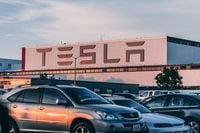In a year marked by surging interest in artificial intelligence and the relentless expansion of energy-hungry data centers, Tesla has found itself at the intersection of two of the most dynamic forces shaping the global economy. As Wall Street analysts and institutional investors intensify their scrutiny of the electric vehicle giant, recent financial moves and market signals suggest that Tesla’s role in the AI-driven energy revolution is only growing more complex—and potentially more lucrative.
On August 21, 2025, Norinchukin Bank, a major institutional investor, disclosed a substantial 32.0% increase in its stake in Tesla during the first quarter, according to its latest filing with the Securities and Exchange Commission. The bank now holds 183,001 shares of Tesla, valued at approximately $47,427,000. This makes Tesla the 19th largest position in Norinchukin Bank’s investment portfolio, representing roughly 0.9% of its total holdings. Several other institutional investors, including Rinkey Investments, True Wealth Design LLC, Acorn Wealth Advisors LLC, Solutions 4 Wealth Ltd, and Capital Management Associates Inc., also reported recent increases in their Tesla stakes, reflecting a broad-based confidence in the company’s prospects.
Yet, beneath these bullish moves lies a growing debate about the sustainability of Tesla’s—and indeed the entire tech sector’s—growth trajectory. As highlighted in a recent article, artificial intelligence is rapidly becoming the most electricity-hungry technology ever invented. AI data centers, the backbone of services like ChatGPT and other large language models, now consume as much energy as small cities. The article notes, “AI is already pushing global power grids to the brink,” a sentiment echoed by industry leaders. Sam Altman, founder of OpenAI, warned, “The future of AI depends on an energy breakthrough.” Elon Musk, Tesla’s CEO, was even more blunt: “AI will run out of electricity by next year.”
This escalating demand for energy is forcing investors to look beyond the usual suspects in the AI boom. While chipmakers and cloud platforms have traditionally dominated headlines, there is growing recognition that the real winners might be companies positioned at the heart of the energy infrastructure. According to the article, “One little-known company—almost entirely overlooked by most AI investors—could be the ultimate backdoor play. It’s not a chipmaker. It’s not a cloud platform. But it might be the most important AI stock in the US owns critical energy infrastructure assets positioned to feed the coming AI energy spike.”
The logic is straightforward: as AI-driven data centers multiply and electric vehicles proliferate, the strain on the electric grid will only intensify. Tesla, which straddles both the automotive and energy generation and storage sectors, is uniquely positioned. The company’s financial health remains robust, with a debt-to-equity ratio of 0.07, a quick ratio of 1.55, and a current ratio of 2.04. Its stock traded at $340.01 on a recent Friday, boasting a market cap of $1.10 trillion, a price-to-earnings ratio of 196.54, and a price-to-earnings-growth ratio of 11.82. For context, Tesla’s shares have ranged from a one-year low of $202.59 to a high of $488.54, underscoring the volatility—and opportunity—that has characterized the stock over the past year.
Institutional confidence is only part of the story. Wall Street analysts remain divided on Tesla’s future, with a consensus “Hold” rating and an average price target of $303.31, according to MarketBeat data. Piper Sandler recently reaffirmed an “overweight” rating with a $400 price target, while Wedbush set an even more optimistic $500 objective. UBS Group took a more cautious stance, setting its target at $290. Meanwhile, Needham & Company LLC maintained a “hold” rating, and Canaccord Genuity Group upgraded its target to $333, citing a “buy” recommendation. In total, one analyst has rated Tesla a Strong Buy, seventeen have issued Buy ratings, fifteen have assigned Hold ratings, and nine have recommended selling the stock.
Tesla’s most recent quarterly earnings report, released on July 23, 2025, revealed earnings per share of $0.40, missing the consensus estimate by $0.03. The company posted revenue of $22.50 billion, falling short of analyst expectations of $23.18 billion. Notably, revenue was down 11.8% year-over-year, and net margin stood at 6.54%. Despite these headwinds, analysts expect Tesla to post earnings per share of 2.56 for the current fiscal year, highlighting ongoing confidence in the company’s ability to navigate market turbulence.
Insider activity at Tesla has also drawn attention. Director Ira Matthew Ehrenpreis sold 477,572 shares at an average price of $357.30, totaling more than $170 million. CFO Vaibhav Taneja also sold 6,000 shares at an average price of $341.02. In the last quarter alone, insiders have sold nearly 600,000 shares, worth over $213 million. Still, company insiders retain a significant 20.70% ownership stake, suggesting a continued alignment with shareholder interests.
Amidst these developments, Tesla’s broader business strategy has come under renewed focus. The company operates in two main segments: Automotive, which includes electric vehicles and related services, and Energy Generation and Storage, which encompasses solar, battery storage, and other clean energy initiatives. With the proliferation of data centers and electric vehicles, Tesla’s role as both a consumer and provider of energy is set to expand.
This dual focus is increasingly relevant as the world grapples with the energy demands of AI. As the article points out, “AI needs energy. Energy needs infrastructure. And infrastructure needs a builder with experience, scale, and execution.” While the piece promotes investment in companies with critical energy assets, it’s clear that Tesla’s unique position at the nexus of transportation, energy, and AI-driven infrastructure makes it a focal point for investors looking to capitalize on the next wave of technological disruption.
Looking forward, the intersection of AI, energy, and transportation will remain a battleground for both innovation and investment. As Wall Street pours billions into artificial intelligence and the supporting infrastructure, Tesla’s ability to adapt and lead could determine not just its own future, but the shape of the digital economy for years to come. For now, with institutional investors increasing their stakes, analysts debating its valuation, and the world’s power grids straining under new demands, Tesla stands as both a symbol and a driver of the next great industrial transformation.




